US Says Iran Nuclear Program Is Advancing In Dangerous Ways
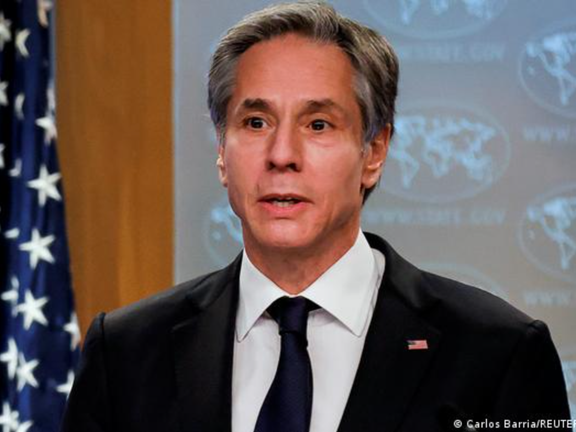
US Secretary of State Antony Blinken says Iran is advancing its nuclear program in increasingly dangerous ways, and its malign activities in the region have also increased.

US Secretary of State Antony Blinken says Iran is advancing its nuclear program in increasingly dangerous ways, and its malign activities in the region have also increased.
In an interview with NPR on Thursday, Blinken reiterated that the US policy remains preventing the Islamic Republic from acquiring a nuclear bomb, noting that the 2015 agreement, JCPOA, had managed to “put Iran’s nuclear program in a box”.
Admitting that Iran is closer than ever to threshold capability to build atomic bombs, he said, “Iran is getting closer and closer to the point where they could produce on very, very short order enough fissile material for a nuclear weapon”.
He said that Washington is in this “challenging situation” due to “one of the worst decisions made in recent American foreign policy” that was walking away from the nuclear agreement, officially known as the JCPOA.
Blinken said “the best thing for our security and the security of our allies and partners in the region” is getting back to the JCPOA “in the weeks ahead – not months ahead, weeks ahead” since Iran is “making advances that will become increasingly hard to reverse because they’re learning things, they’re doing new things” without the constraints of the deal.
He repeated earlier statements that the US is lookingat other options if it can’t get back to mutual compliance in a few weeks.
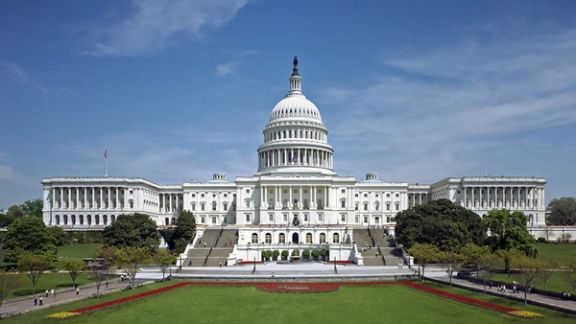
More than 100 Republican members of the US Congress have written to President Joe Biden urging him to end nuclear talks with Iran and enforce sanctions.
The signatories have pointed out that Administration officials say the talks are not progressing and Biden should stop the attempt to revive the 2015 nuclear agreement, the JCPOA, and instead strongly enforce existing sanctions, “particularly with respect to the oil trade between Iran and the People’s Republic of China (PRC).”
Chinese illicit imports of Iranian oil in contravention of US sanctions at least doubled in 2021, as Iran’s daily exports now stand at around 600,000 barrels.
The lawmakers also highlighted Iran’s advancement in enriching uranium at 60 percent, which started one year ago as the Biden Administration was preparing to enter talks with Tehran. Calling Iran’s actions and delaying tactics “provocations” the letter says this behavior is “the epitome of bad faith,” and calls for a strong enforcement of existing sanctions.
“If Iran is not prepared to negotiate as things stand, we need to build our leverage to compel them to negotiate a better, stricter deal with no sunsets,” the lawmakers say.
As Republicans criticize the Administration’s policy toward Iran, the White House is trying to blame former president Donald Trump’s withdrawal from the JCPOA, as the reason for the current situation.
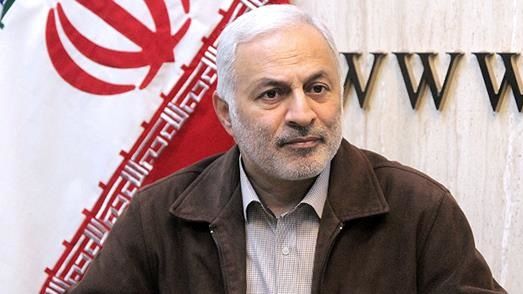
The chairman of Iranian Parliament's National Security and Foreign Policy Committee has said that an "interim deal" could be considered in Vienna nuclear talks.
Speaking to the Iranian Labour News Agency (ILNA) Wednesday, Vahid Jalalzadeh said the other parties to the 2015 nuclear agreement, the Joint Comprehensive Plan of Action (JCPOA) want an interim deal and have made some proposals. "This is not ideal although we have not ruled it out and are considering it," Jalalzadeh said.
Jalalzadeh insisted that Iran does not want a new deal and said the United States wants the JCPOA to be restored because it will bring advantages to it such as limiting Iran's nuclear capabilities and added that the Islamic Republic would only allow the return of the US if it can be assured that Iran can also reap the benefits of the deal.
Russian Foreign Minister Sergei Ryabkov said Monday after Russian-US talks that "various schemes were possible" for reaching the ultimate goal in the Vienna talks. "A step-by-step approach based on reciprocity [is likely to be used] to achieve the main goal," the top Russian diplomat said according to Tass while reiterating that that he saw no need for setting any deadlines for reaching a final decision on the JCPOA.
The US and its European allies have warned that the window for further talks in Vienna could close by the end of January or the beginning of February. Following high-level talks with Israeli officials in Jerusalem on December 22, US National Security Advisor Jake Sullivan told Haaretz that Washington and others have not publicly put a date on the calendar “but behind closed doors, there is a deadline, and it is not far away.”
On Monday, Foreign Ministry Spokesman Saeed Khatibzadeh told reporters that Tehran would not agree to any deals without the lifting of US sanctions and "verification and receiving guarantees" and it only wants a "lasting and reliable agreement". Khatibzadeh said Tehran was not satified with the pace of the talks and would not accept any "forged dates" to conclude the talks.
Tasnim news agency which is affiliated with the Revolutionary Guards (IRGC), said Wednesday that it has been informed by its sources that "a major part of the talks" in Vienna in the past few days were focused on "verification" of the lifting of sanctions and "receiving guarantees" that the other sides will not renege on the deal.
Tasnim also reported that "non-papers are exchanged on a daily basis" with the US delegation through the European Union representative Enrique Mora. The Iranian delegation insists on these two demands, Tasnim said, to make sure the US would not fail to deliver its commitments “as occurred during the presidency of Barack Obama”, or withdrawal as his successor Donald Trump did. "The stability factor in the agreement is of a higher importance," Tasnim said to ensure any prospective agreement would have lasting results.
"During the Obama period Iran's compliance was meticulously and quantitively verified by the International Atomic Energy Organization (IAEA) whereas there was no mechanism for verification of the other sides' compliance with the lifting of sanctions. This was the reason that the lifting of sanctions did not bear tangible outcomes for Iran," Tasnim wrote.
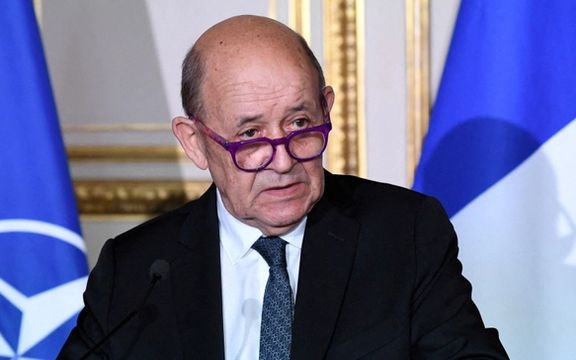
France has once again warned of slow progress in Iran nuclear talks, while the United States said the pace must be quickened if the JCPOA is to be salvaged.
Iran and world powers negotiating in Vienna are still far from any agreement to revive their 2015 nuclear deal despite making some progress at the end of December, France's foreign minister said on Tuesday.
Iran and Russia have sounded a much more optimistic tone since late December, speaking of progress virtually on daily basis. Iran even said on Monday its negotiating team is moving "at the speed of light".
Indirect talks between Iran and the United States on salvaging the 2015 Iran nuclear deal resumed on January 3. The United Kingdom, France, Germany and EU officials act as mediators during the talk. Russia has also assumed the role of a mediator, with its chief envoy, Mikhail Ulyanov often meeting with US Special Representative for Iran Robert Malley.
Western diplomats have indicated they are hoping to have a breakthrough by the end of January or early February, but sharp differences remain with the toughest issues still unresolved. Iran has rejected any deadline imposed by Western powers.
"The discussions are ongoing. They are slow, too slow and that creates a gap that jeopardizes the chance of finding a solution that respects the interests of all sides," Jean-Yves le Drian told a parliamentary hearing.
"Bits of progress were made at the end of December, but we are still far from concluding this negotiation."
At a US State Department briefing, Victoria Nuland, the Under Secretary of State for Political Affairs, was asked about the Vienna talks, but she sidestepped the question. The department spokesman Ned Price acknowledged that the pace was much slower than needed to save the JCPOA.
He referred to earlier US statements that there was modest progress in the past two weeks, but added, “Of course, that progress needs to be more than modest if we are going to be in a position to salvage the JCPOA and to ensure that the nonproliferation benefits that the JCPOA conveys aren’t diminished, watered down, eliminated by the advancements that Iran has made in its nuclear program.”
Asked if the United States believes Iran has a nuclear program that could lead to the same situation that exists with North Korea, Price threw the ball to the UN nuclear watchdog, IAEA’s court, saying they are the ones who have inspections in Iran.
The IAEA inspections have not stopped Iran’s uranium enrichment at higher levels that have produced more than 200 kilograms of enriched fissile material. The IAEA also cannot know about any Iranian activities at hidden or military sites because its inspections are limited to a few designated installations, unless there is credible evidence from other sources pointing to illicit activities.
Price again insisted that the current crisis with Iran’s nuclear program is the result of former president Donald Trump pulling out of the JCPOA in 2018, in “an ill-considered or perhaps unconsidered decision...” He reiterated that Trump’s move and imposition of ‘maximum pressure’ sanctions did not produce the desired results, and “Quite the opposite is true. “
But the Biden Administration policy of trying to restore the JCPOA, that Trump and other critics deemed insufficient to stop Iran from becoming a nuclear power, has also not succeeded.
Iran began its higher-level uranium enrichment at 60 percent purity after President Joe Biden’s election, just weeks before the Vienna talks began last April.
With reporting by Reuters
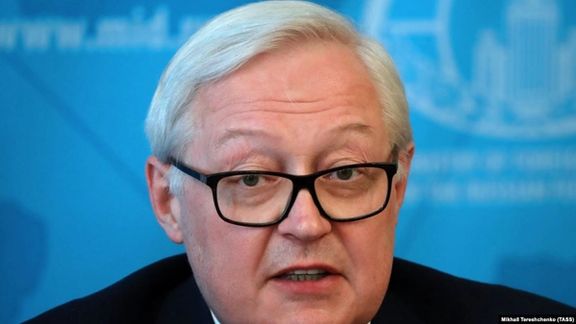
A top Russian diplomat says the Vienna talks have "picked up speed" and chances for reviving Iran’s nuclear deal, the JCPOA have increased, but problems remain.
Deputy Foreign Minister Sergei Ryabkov said that the talks have gained momentum as all the participants are showing readiness to find solutions for the remaining problems. Expansion of Tehran’s nuclear program and issues related to US sanctions are still hindering the process, he added.
Ryabkov maintained that the ultimate goal is a return to the implementation of the JCPOA in its original parameters and various schemes are possible for that, including a step-by-step approach based on reciprocity.
“I emphasize that hypothetical intermediate steps are not a replacement, not a substitution, not an alternative to the basic agreement, which must be restored in full”, Ryabkov said without elaborating.
Russia’s top negotiator Mikhail Ulyanov tweeted on Tuesday that the talks are being held in “varying geometry” as the need arises, but nobody is left behind.
On Monday, Iran’s foreign ministry spokesman said Tehran is not satisfied with the pace of nuclear talks in Vienna but would not accept deadlines.
"Time is important to us, but it is not possible that the other side moves like a turtle and we move at the speed of light," Saeed Khatibzadeh said, adding that Tehran wants a “sustainable and reliable” agreement.
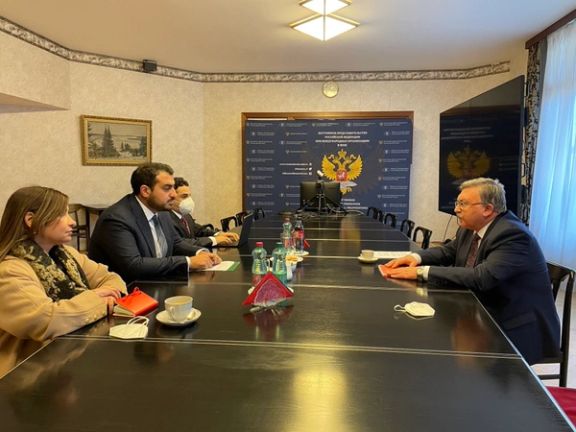
While a Saudi Arabian diplomat last week met with nuclear negotiators from world powers in Vienna, Iran is trying to dispel any perception of being circumvented.
The government spokesman said Tuesday Tehran is not involved and would not comment on the recent meetings of Saudi and South Korean representatives with other parties to the Vienna talks.
At his press briefing Tuesday, Ali Bahadori-Jahromi said the presence of “some countries” in Vienna and their meetings with the other participants in the talks is "their independent decision and based on their mutual relations". "Such consultations is their business and will not affect the atmosphere of the talks," he insisted.
"Naturally, the Iranian delegation is not involved in such meetings and has not, and will not, comment on them," Bahadori-Jahromi told reporters.
The Saudi envoy to international organizations in Vienna, Abdullah bin Khalid, has reportedly met separatelywith Russian, Chinese and French delegations as well as the US Special representative for Iran Robert Malley to discuss the latest developments in the talks for restoring the 2015 nuclear deal, the Joint Comprehensive Plan of Action (JCPOA).
Russia's envoy to the talks, Mikhail Ulyanov, in a tweet after his meeting with the Saudi envoy said the two sides had exchanged views on prospects of a security dialogue in the Persian Gulf region.
The news of Saudi diplomatic contacts with JCPOA negotiators has raised some controversies in Iran. Some pundits argue that the involvement of Riyadh is very different from Seoul's involvement due to the longstanding issue of billions of dollars in Iranian money frozen in South Korea due to US sanctions. Unfreezing these assets is related to the Vienna talks.
Speaking to Iran Diplomacy website, former chairman of the Iranian parliament's national security and foreign policy committee, Heshmatollah Falahatpisheh, said whereas Korea's involvement should be taken positively, the Saudi involvement was negative.
"The Saudi involvement in Vienna talks, through any member of the 4+1 [current JCPOA members including France, Britain, Russia, China, and Germany] or the United States, should be seen in the context of a balancing act against Tehran in the talks," Falahatpisheh, a former conservative lawmaker, said.
Falahatpished added that in his view the French, Americans and even Russians will all benefit from Saudi involvement in the talks which he insisted should have involved only three players – Iran, the US, and the United Nations' Security Council as an international organization. He also criticized Russia's role in the talks and said they were as much responsible for involving the Saudis in the Vienna talks as the European sides, particularly France.
The former high-profile lawmaker also argued that Iran had always insisted it would not consent to anything other than the nuclear issue to be included in the negotiations, but the Saudi involvement has in effect broken Iran's redlines. "Saudi involvement in Vienna means attempts to examine the regional concerns they claim to have due to Iran's missile and defensive power as well as its regional influence," he said.
Arab countries in the region, particularly Saudi Arabia, have long demanded to be engaged in the nuclear talks with Iran which they say is directly related to their security due to very close geographical proximity.
Last week, Saudi Arabia’s foreign minister Prince Faisal bin Farhan reiterated Riyadh’s concernsabout Iran’s “destabilizing role” and “transgressions” in its nuclear program.
Riyadh and Tehran held talks last year to reduce tensions with the aim of restoring diplomatic ties broken since January 2016.
Speaking to Al Jazeera, Foreign Minister Hossein Amir-Abdollahian described the ongoing dialogue with Saudi Arabia as "positive and constructive" and said Tehran was ready to restore relations with Riyadh "at any time".